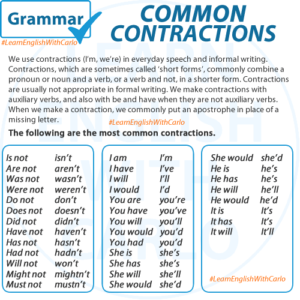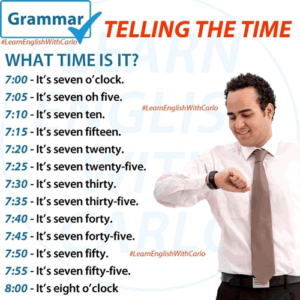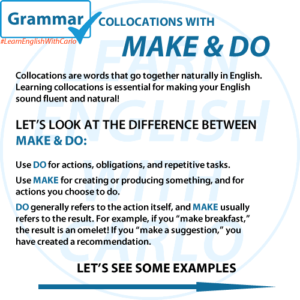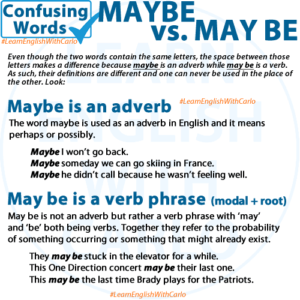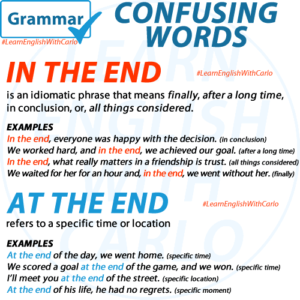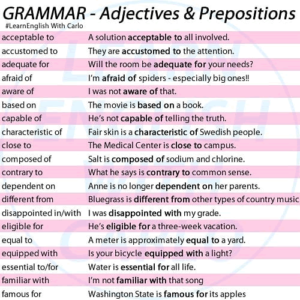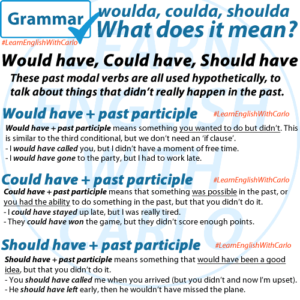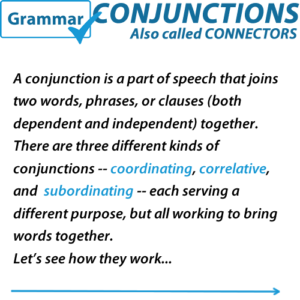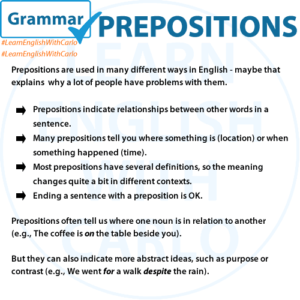GRAMMAR – COMMON CONTRACTIONS We use contractions (I’m, we’re) in everyday speech and informal writing. Contractions, which are sometimes called ‘short forms’, commonly combine a pronoun or noun and a verb, or a verb and not, in a shorter form. Contractions are usually not appropriate in formal writing. We make contractions with auxiliary verbs, and …
Category: GRAMMAR
Permanent link to this article: https://englishyourway.com.br/grammar-common-contractions/
Oct 01
GRAMMAR – Telling the Time
GRAMMAR – Telling the Time There are two ways to tell the time in English. The TRADITIONAL British way and the NEWER American way. In the traditional British way, we say the minutes, or portion of an hour (quarter or half), followed by a preposition (past, or to) and then the hour. The US method …
Permanent link to this article: https://englishyourway.com.br/grammar-telling-the-time/
Sep 29
GRAMMAR – Collocations with MAKE & DO
Collocations are words that go together naturally in English.Learning collocations is essential for making your English sound fluent and natural! LET’S LOOK AT THE DIFFERENCE BETWEEN MAKE & DO:Use DO for actions, obligations, and repetitive tasks.Use MAKE for creating or producing something, and for actions you choose to do. DO generally refers to the action …
Permanent link to this article: https://englishyourway.com.br/grammar-collocations-with-make-do/
Sep 28
GRAMMAR – MAYBE vs MAY BE
MAYBE vs MAY BE Even though the two words contain the same letters, the space between those letters makes a difference because maybe is an adverb while may be is a verb. As such, their definitions are different and one can never be used in the place of the other. Look: MAY BE (Verb Phrase) …
Permanent link to this article: https://englishyourway.com.br/grammar-maybe-vs-may-be/
Sep 26
GRAMMAR – AT THE END vs IN THE END
GRAMMAR – AT THE END vs IN THE END English learners often confuse the phrases at the end and in the end because they sound similar. However, their meanings and usage are distinct. Let’s break them down and look at some examples to help you use these phrases correctly. What Does AT THE END Mean? …
Permanent link to this article: https://englishyourway.com.br/grammar-at-the-end-vs-in-the-end/
Permanent link to this article: https://englishyourway.com.br/adjectives-with-prepositions/
Sep 18
Woulda, Coulda, Shoulda – What Does It Mean?
You may have heard native English speakers use phrases like woulda, coulda, or shoulda. But what do they mean? These are informal, spoken forms of would have, could have, and should have. These past modal verbs are used to talk about things that didn’t happen, but that we imagine or wish had been different. Let’s …
Permanent link to this article: https://englishyourway.com.br/woulda-coulda-shoulda/
Sep 17
GRAMMAR – Conjunctions
A conjunction is a part of speech that joins two words, phrases, or clauses (both dependent and independent) together. There are three different kinds of conjunctions — coordinating, correlative, and subordinating — each serving a different purpose, but all working to bring words together.Let’s see how they work… Coordinating conjunctions are used to join equal …
Permanent link to this article: https://englishyourway.com.br/grammar-conjunctions-3/
Sep 15
The Difference Between “Used to” and “Would”
When talking about past habits or repeated actions, learners of English often encounter two phrases: “used to” and “would.” While these two expressions have similarities, they are not interchangeable in every context. Let’s explore their meanings, uses, and differences in detail. What Does “Used to” Mean? “Used to” refers to habits, actions, or states that …
Permanent link to this article: https://englishyourway.com.br/used-to-vs-would/
Sep 11
GRAMMAR – Prepositions
Types of Prepositions The different types of prepositions are used to provide us with different information with regard to time (prepositions of time), place (prepositions of place), and direction (prepositions of movement). Besides these three, there are others: prepositions of manner and prepositions of cause and reason. Time: We’ve been working since yesterday.Direction: Go to …
Permanent link to this article: https://englishyourway.com.br/grammar-prepositions-2/

